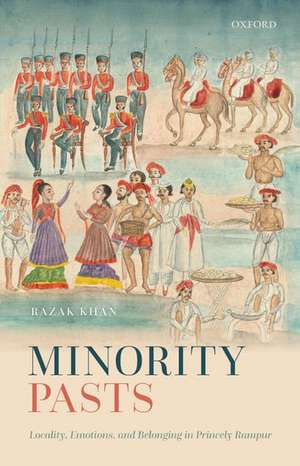Minority Pasts: Locality, Emotions, and Belonging in Princely Rampur
Autor Razak Khanen Limba Engleză Hardback – 21 sep 2022
Preț: 357.53 lei
Preț vechi: 493.06 lei
-27% Nou
Puncte Express: 536
Preț estimativ în valută:
68.41€ • 71.43$ • 56.62£
68.41€ • 71.43$ • 56.62£
Carte disponibilă
Livrare economică 03-10 martie
Preluare comenzi: 021 569.72.76
Specificații
ISBN-13: 9788194831686
ISBN-10: 8194831687
Pagini: 336
Dimensiuni: 145 x 223 x 24 mm
Greutate: 0.43 kg
Editura: OUP INDIA
Colecția OUP India
Locul publicării:Delhi, India
ISBN-10: 8194831687
Pagini: 336
Dimensiuni: 145 x 223 x 24 mm
Greutate: 0.43 kg
Editura: OUP INDIA
Colecția OUP India
Locul publicării:Delhi, India
Recenzii
Although Minority Pasts places Rampur under a specific research lens, the methodology used by Khan could easily be applied to other cities in contemporary India. The topics discussed in the book force us to reassess how we perceive the modern inhabitants of cities whose social groups allegiances have been fractured by the displacements following 1857 and 1947. While Minority Pasts addresses a post-1857 Rohilla society, the broader study of Rohilla culture and history still offers readers access into an untouched area of scholarship that is fruitful to furthering explorations, particularly for the decades following the defeat of the Rohillas by the British in 1774.
Regardless, the admirable multi-lingual proficiency of Razak Khan and his aptitude to draw out information from Persian, Pashto, Urdu, Hindi and English archives, not to forget the oral histories of the Rampuris, make the book a noteworthy study of the diversity of histories and identities of Muslims in Rampur.
In an age when history writing on South Asia often turns adversarially political, especially in the context of reading and re-evaluating Muslim presence in India, one can only marvel at the plethora of allusions inherent in the title of Razak Khan's book, Minority Pasts: Locality, Emotions, and Belonging in Princely Rampur. While plural in the pasts points to a whole range of pasts, defined in a variety of ways and existing despite homogenizing tendencies of the pan-regionally produced accounts, minority implies that those pasts relate to minority communities: religious, geographical, class or gender-based, etc. Minority Pasts as a phrase entail the existence of many minorities and many pasts, peripheral, local, not important in the larger scheme of things.
Regardless, the admirable multi-lingual proficiency of Razak Khan and his aptitude to draw out information from Persian, Pashto, Urdu, Hindi and English archives, not to forget the oral histories of the Rampuris, make the book a noteworthy study of the diversity of histories and identities of Muslims in Rampur.
In an age when history writing on South Asia often turns adversarially political, especially in the context of reading and re-evaluating Muslim presence in India, one can only marvel at the plethora of allusions inherent in the title of Razak Khan's book, Minority Pasts: Locality, Emotions, and Belonging in Princely Rampur. While plural in the pasts points to a whole range of pasts, defined in a variety of ways and existing despite homogenizing tendencies of the pan-regionally produced accounts, minority implies that those pasts relate to minority communities: religious, geographical, class or gender-based, etc. Minority Pasts as a phrase entail the existence of many minorities and many pasts, peripheral, local, not important in the larger scheme of things.
Notă biografică
Dr. Razak Khan is a Research Fellow at the Centre for Modern Indian Studies, University of Goettingen, Germany. He researches and writes about the socio-cultural, intellectual, and affective history of South Asian Muslimsin Modern India and Germany. He has published articles and edited special issues in the Journal of the Economic and Social History of the Orient (Brill, 2015) and Comparative Studies in South Asia, Africa and the Middle East (Duke University Press, 2020). He recently also edited The Incomparable Festival (Penguin, 2021).
